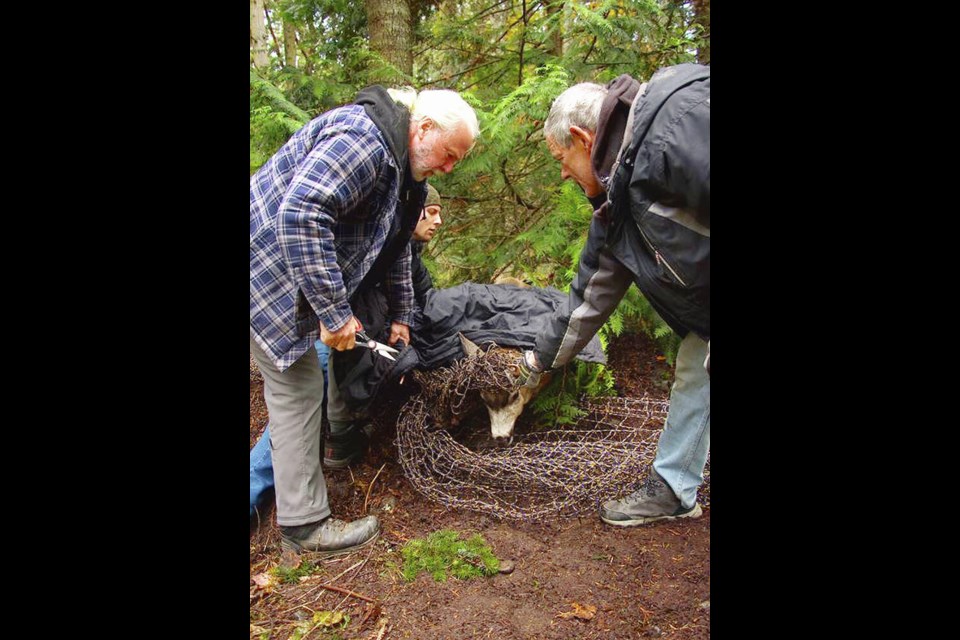Next week’s planned deer cull on Sidney Island has been shelved after animals became tangled and trapped in netting installed to herd them into areas where they would be killed.
Parks Canada said Wednesday it will be consulting with First Nations and other project partners on a “re-imagined solution” to restore the ecosystem, which has been damaged by invasive fallow deer.
The announcement came after a fallow deer was found dead in late October with its antlers tangled in netting that was installed as fencing, with wounds on its legs.
An island resident said at the time he heard that six deer had died in the previous week. Parks Canada confirmed three deaths.
Some Island residents who have come across exhausted and frightened deer tangled in the recycled aquaculture netting have risked injury to free the animals.
Parks Canada said in a statement that the decision to postpone the cull was made as a result of several factors, “most importantly the welfare of the animals of the island and the lack of effectiveness of the netting installed to herd deer, causing a lower probability of a successful outcome.”
In the first phase of the cull in late December 2023, deer were shot from a helicopter by sharpshooters during the day and on the ground at night. A total of 84 deer were killed, including 18 native black-tail deer, in the $800,000 effort, which took place over 11 days.
The decision to postpone the second phase, which had been set to start on Nov. 15, was welcomed by critics who have questioned the $12-million multi-year strategy to rid the nine-square-kilometre island of introduced fallow deer and restore the ecosystem.
The plan squeaked through a 2023 vote among island residents, with 52 per cent in favour.
“I’m very happy that they’re taking this pause to reevaluate,” said Sidney Island resident Paul Lalonde.
Carla Purves, another island resident, said she was also relieved to hear the project has been postponed.
“Seeing the results of the netting has been heartbreaking and hopefully this means it will come down as quickly as possible before any new entanglements occur.”
Purves said she is cautiously optimistic that the entire project will be reconsidered to focus on ecological restoration without deer eradication.
North Saanich resident David Bird, an emeritus professor of wildlife biology at McGill University who has hunted deer on Sidney Island, said that shooting animals from a helicopter is “absolutely inhumane” compared to having hunters kill deer from a hidden location with a single bullet.
The fallow deer population has dropped from about 2,500 about 25 years ago to possibly fewer than 200 today as a result of annual hunts and regular culls by island residents.
He said he doesn’t understand why there was no proper deer survey or recent evaluation of plant life to see if it’s recovering now that the deer population is a fraction of its former size.
Bird said his gut feeling is that the announcement from Parks Canada is “simply a delaying tactic allowing them to lick their wounds.”
It’s unlikely that Parks Canada will back off completely, he said. “I think they’ve dug their heels in and are going to spend an excessive amount of taxpayers’ money on something that local, professional hunters could have done for a lot less and at no cost to taxpayers.”




